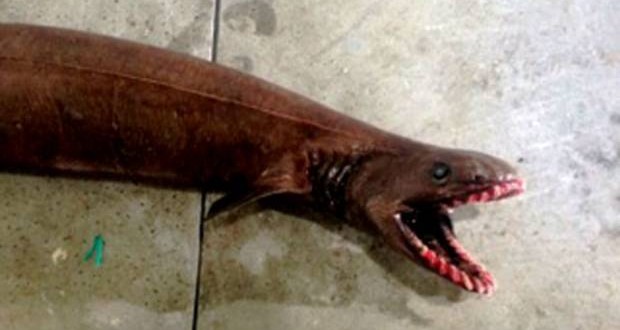A rare frilled shark captured off australian coast, The fish gets its name from its six pairs of gills and is one of two remaining species dating back 80 million years.
[fwdevp preset_id=”8″ video_path=”_nsAkGdtQ5o”]South East Trawl Fishing Association (SETFA) chief executive Simon Boag told ABC that this is the first sighting of the species alive by humans.
“It does look 80 million years old. It looks prehistoric… like it’s from another time,” he said.
He said local fishermen were left scratching their heads at the sight of the two metre long creature, whose head and body resemble an eel.
“It has 300 teeth over 25 rows, so once you’re in that mouth, you’re not coming out,” Mr Boag added. The shark that was pulled from the water was two metres long and found 700 metres under the water.
Usually the species is found deeper at 1,500 metres but it rare to find them below 1,200 metres, according to the SETFA website.
Its long, flexible jaws enable it to swallow prey whole, while its 300 needle-shaped teeth aligned in 25 rows make it difficult for the prey to escape.
The specimen was offered to the (Commonwealth Scientific and Industrial Research Organisation) CSIRO but was not taken in, and is now believed to have been sold.
Agencies/Canadajournal
 Canada Journal – News of the World Articles and videos to bring you the biggest Canadian news stories from across the country every day
Canada Journal – News of the World Articles and videos to bring you the biggest Canadian news stories from across the country every day



